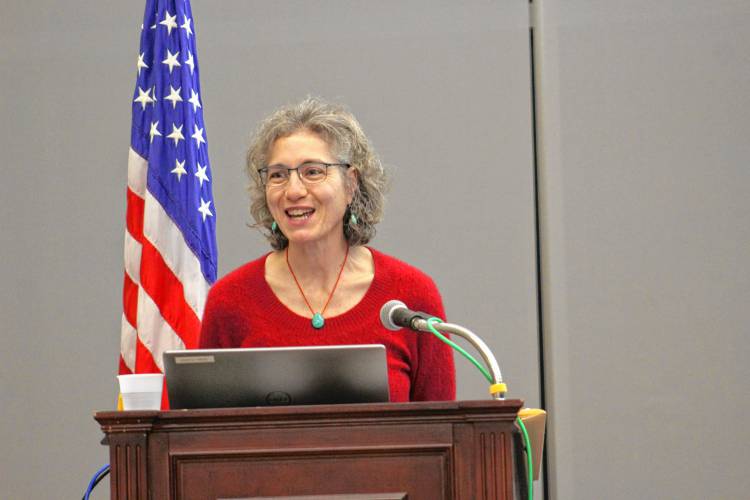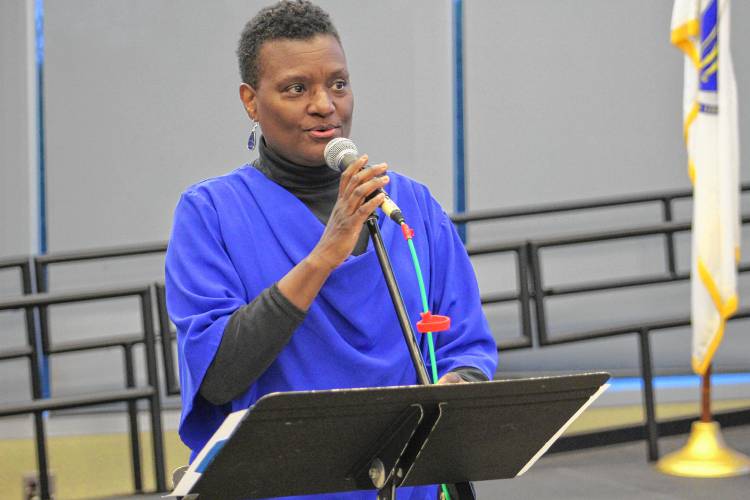Gender pay gap closing, regional report finds
| Published: 11-30-2023 6:27 PM |
GREENFIELD — Though gender inequities continue, many women and girls have reported improved outcomes over the past 10 years, according to the Women’s Fund of Western Massachusetts.
The nonprofit that provides funding to agencies working to increase gender equity recently completed its 2023 research report and a few dozen people convened at Greenfield Community College on Wednesday afternoon to hear the key findings. This marks the organization’s third commissioned report on the status of women and girls since 2013. The report was prepared by the Public Health Institute of Western Massachusetts.
Lisa Ranghelli, director of assessment and capacity building with the Public Health Institute of Western Massachusetts, informed attendees that the gender pay gap has gradually narrowed over time. Following the COVID-19 pandemic’s negative economic impacts, women’s unemployment in 2021 fell to pre-pandemic levels and female labor force participation rates also rebounded. Interviewees also reported many women of color and immigrant women have embraced entrepreneurship by starting and expanding small businesses.
A female working in Franklin County earns on average 87 cents for every dollar a man makes here. This figure is better than the 15-cent discrepancy in Hampden County or the 18-cent one in Berkshire County but it falls behind the figures in Hampshire County, where a woman makes 89 cents for every dollar a man earns. According to the Women’s Fund of Western Massachusetts, the gender pay gap can be attributed to several factors, including lower pay in fields largely represented by women, less access to higher education among some racial and ethnic groups, and caregiving responsibilities. When the pandemic brought the world to a screeching halt, women were disproportionately laid off or forced to leave jobs to be home with their children after child care centers closed and remote schooling began.
Ranghelli noted this report marks the first-time inclusion of transgender and gender-diverse people in the research focus, and there was deeper research about groups that don’t appear in much data.
The region’s female population is also becoming more racially and ethnically diverse, though Franklin County remains the most monocultural in the state, as it is 88% white. Latina women and girls make up 16% of the regional female population, and 4% of all females in this county. Also, 29% of household heads are single women in Franklin County and throughout the area.
On a broader scale, the report’s statistics reveal that 8% of corporate CEOs in Massachusetts in 2023 were female and women make up 29% of executive leadership.
Since 1997, the Women’s Fund of Western Massachusetts has awarded at least $2.5 million to at least 150 nonprofits that are working to increase gender equity.
Article continues after...
Yesterday's Most Read Articles
 Charlemont planners approve special permit for Hinata Mountainside Resort
Charlemont planners approve special permit for Hinata Mountainside Resort
 $338K fraud drains town coffers in Orange
$338K fraud drains town coffers in Orange
 Greenfield residents allege sound and odor issues from candle, cannabis businesses
Greenfield residents allege sound and odor issues from candle, cannabis businesses
 Fire at Rainbow Motel in Whately leaves 17 without a home
Fire at Rainbow Motel in Whately leaves 17 without a home
 Hotfire Bar and Grill to open Memorial Day weekend in Shelburne Falls
Hotfire Bar and Grill to open Memorial Day weekend in Shelburne Falls
 Mohawk Trail’s Chay Mojallali sets school record in high jump as Franklin County contingent racks up titles at Western Mass. Division 2 Track & Field Championships (PHOTOS)
Mohawk Trail’s Chay Mojallali sets school record in high jump as Franklin County contingent racks up titles at Western Mass. Division 2 Track & Field Championships (PHOTOS)
“So I’d say that we’ve been doing some great work out there,” said Amihan Matias, senior director of community partnerships.
The 2023 report also mentions that the pandemic exacerbated the need for, and barriers to, support following domestic violence. Teen sexual and dating violence has increased since 2019, and the rates are significantly higher among LGBTQ students. Also, the report noted, students of color and gender-diverse learners are disciplined at unequal rates in their schools.
As part of her presentation, Ranghelli mentioned women currently fill five of six statewide offices in Massachusetts and this includes Gov. Maura Healey, the first woman and first openly gay person elected to the job, and Andrea Campbell, the first Black woman elected as attorney general. The 2023 report also states this region has made progress in state legislative representation, as 10 of the 27 politicians representing western Massachusetts are women. Five of the 11 mayors in western Massachusetts are women, though all are white.
Both the full report and key findings can be accessed at the Women’s Fund’s Data Hub at bit.ly/3uwNEr2.
Reach Domenic Poli at: dpoli@recorder.com or 413-930-4120.




 PHOTOS: 22 years of sharing wellness resources in Greenfield
PHOTOS: 22 years of sharing wellness resources in Greenfield Regional listening session to inform development of statewide housing plan
Regional listening session to inform development of statewide housing plan
